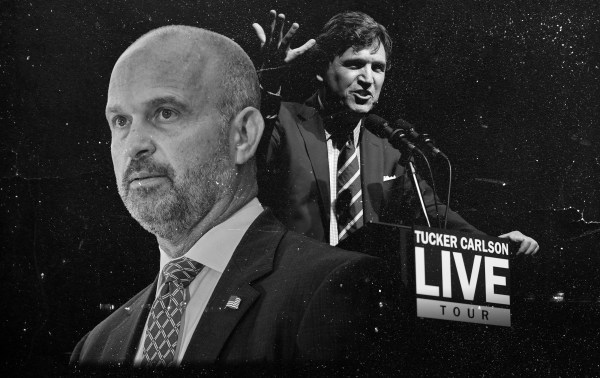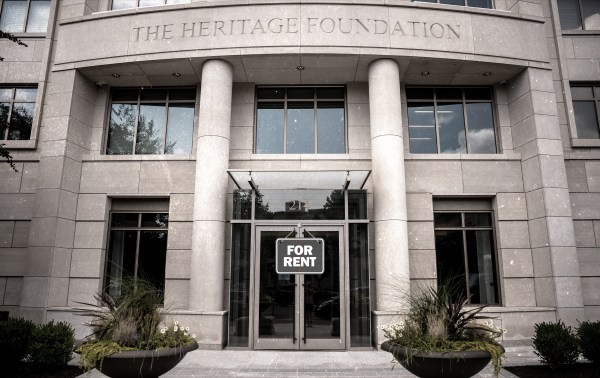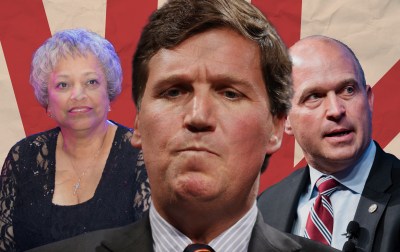Turn any article into a podcast. Upgrade now to start listening.
Premium Members can share articles with friends & family to bypass the paywall.
On the first day of June 2020, as the COVID lockdowns persisted and protests over the death of George Floyd by Minneapolis police were already causing unrest in multiple American cities, Tucker Carlson—then the highest-rated host on Fox News—called up the Heritage Foundation.
According to four former Heritage employees familiar with the call, an angry Carlson told a member of the senior staff that he was planning to go hard after Kay Coles James, then the president of the conservative think tank, on his TV show that night. “He was hot,” recalled the employee who took the call. So hot, in fact, that some rattled senior Heritage staffers convened strategy sessions on how to handle what they expected to be a direct attack on Heritage and Coles James. (“If I disagree with people, I like to tell them directly,” Carlson said over text message when asked about the call.)
What had the president of Heritage done to earn the ire of the No. 1 guy in cable news? Coles James, a lifelong conservative and a black woman born in segregated Richmond, Virginia, had penned an op-ed for Fox News following the death of Floyd, calling racism a “fatal wound” on the country and urging Americans to “speak up and reject the racism and division in their own communities.” The op-ed also called on America to use the “country’s founding principles” to “guide us” to a better future for all its citizens.
To Carlson, though, Coles James’ words were emblematic of how conservative leaders had “joined the left’s chorus” in criticizing America. At the beginning of his June 1 show, Carlson delivered a lengthy monologue following a weekend of violent protests in some cities. In the middle of his nearly half-hour-long broadside, Carlson singled out Coles James and Heritage: “That’s the largest conservative think tank in the country. You may have sent them money, hopefully for the last time.”
Carlson went on. “Kay Coles James wrote a long screed denouncing America as an irredeemably racist nation,” he said—failing to note that her op-ed was not only published by his own employer but also did not, at any point, describe America as “irredeemably racist.”
That one-two punch—criticizing Coles James and calling on his legion of viewers to stop donating to the organization she led—sent shockwaves into the halls of Heritage itself. Carlson was not only a very popular cable-news host but, to many in the conservative movement, the leader of the younger, more nationalist vanguard. For those within Heritage who saw Coles James as a dinosaur, a representative of an outdated version of conservatism, Carlson’s attack on her was confirmation that Heritage was being led down the path toward irrelevance. And even those who had hoped Coles James could resist the more radical and unmoored right-wingism embodied by Carlson were disappointed that perhaps she was not up to the task.
The story of Carlson’s stranglehold on an aging conservative think tank is part of a larger saga of how multiple institutions on the political right have suffered from an identity crisis in the age of Donald Trump.
Carlson was still steaming about Coles James a month later when, as a guest on The Federalist’s podcast, he ranted about the uselessness of conservative organizations like Heritage. “Kay Coles James is not going to run the Heritage Foundation a year from now,” he said.
And Carlson was right. In March 2021, Coles James would announce she was resigning from Heritage, ending her rocky and transitional presidency of one of the pillars of the conservative movement in Washington. Carlson was at least partly responsible for her departure, with his public and private diatribes against Coles James creating an untenable situation for her. Some board members had already expressed their dissatisfaction that she and Heritage had been insufficiently helpful to Donald Trump’s presidency and reelection effort—an odd charge to make against a nonprofit, independent, quasi-academic policy shop that had always been ideological but never overtly partisan. Drawing the ire of Carlson and being out of step with where the energy of the movement was? That didn’t help matters.
Her successor was Kevin Roberts, the former head of a conservative think tank in Texas who promised to be a steward of the institution’s legacy while leading it into the future. But in the past two weeks, Roberts’ own leadership of Heritage has been threatened by an entanglement with Carlson—though this time, the problem was not that the Heritage president had angered Carlson but that he had embraced him too tightly after the host had welcomed neo-Nazi Nick Fuentes onto his online show. It seems that every time Heritage has a problem, Carlson is somehow involved.
“I try to stay away from think tank people,” Carlson told The Dispatch over text. “In general they’re boring and dumb.”
Boring and dumb or not, it’s simply not true that he keeps his distance from this particular think tank and its people. Carlson’s influence at Heritage over the past several years is undeniable and even recognized by the organization itself. He was, in fact, the recipient of Heritage’s Salvatori Prize in American Citizenship in 2018 (“Congrats to my friend,” Coles James tweeted at the time) as well as the keynote speaker at Heritage’s 50th anniversary celebration in 2023. Heritage had also spent lots of money advertising on Carlson’s X show, both before and after the 2024 election, with Carlson himself doing personal ad reads urging viewers to go to “heritage dot org slash Tucker” to donate. In fact, in part of his “explanation” to the Heritage staff about why he had defended Carlson after the Fuentes interview, Roberts noted that the organization had “just concluded a paid media partnership with Tucker in the summer.”
But Roberts’ bear hug with Carlson is what has also led many people who care deeply about the organization to shake their heads at how he’s shaping the institution. “Tucker ruined Heritage,” lamented one former senior staffer.
The story of Carlson’s stranglehold on an aging conservative think tank is part of a larger saga of how multiple institutions on the political right have suffered from an identity crisis in the age of Donald Trump. As the standard-bearer for the GOP, Trump brought to America’s conservative party a populist energy along with a darker approach to partisan politics. He had a clear disdain for the conservative movement and its institutions, and to the extent that he had interest in them it was to either co-opt them or to revel in their unraveling.
With an unprincipled and vindictive president as the Republican Party’s leader, the organizations and establishments built on conservative principles found themselves faced with the choice of adapting to the more populist times or risk being left behind. In that space, ideologies that looked askance at the classical liberalism that had informed American conservatism for decades began to find their footholds: Common-good conservatism, national conservatism, and what had once been called “paleoconservatism” were supposedly more popular with young activists than the “dead consensus” of “warmed-over Reaganism.”
That these ideologies—more enamored of domestic government intervention, suspicious of American global leadership, inclined toward industrial economic policy, and privileging an idealized version of the past—mapped relatively neatly onto Trump’s own issue set was a feature, not a bug. Trump and Trump-style conservatism looked, and continues to look, like the future.
In this environment, the leadership of the Heritage Foundation has appeared confused. People familiar with the makeup of the board of trustees say it contains several strong personalities who have wanted the organization to be a more muscular and potent force for effecting conservative change. For some of those trustees, that would mean harnessing the forces of nationalism and populism, not rejecting them. For other trustees, however, maintaining Heritage’s connection to its founding principles of limited government, social conservatism, and a strong national defense seemed all the more important as those principles came into question in the Trump era.
The trustees’ selection in 2018 of Coles James, an amiable Reaganite conservative with close ties to the organization’s founder, Ed Feulner, reflected how unsure the Heritage board was about the longevity of this new populist gesture that had elected Trump in what looked at the time like a fluke election two years earlier.
In replacing her with Roberts, who is 25 years her junior, the board demonstrated its desire to have a younger voice argue for an unhyphenated conservatism that was both big-tent in its outreach and consistent in its principles.
And that’s how it appeared at first. “I never put an adjective in front of that word,” Roberts said when describing himself as a conservative during his first address to the Heritage staff after his selection as president in October 2021. A few minutes later, Coles James took the stage to welcome Roberts as her successor. “I have never been more optimistic about the future of Heritage,” she said.
Any optimism from traditional conservatives about Roberts evaporated fairly quickly, however. Within his first year on the job, Heritage scholars and staff began to see a sharp change in how the think tank handled issues with which they were out of step with the political urges of the Republican base—or, to put it another way, with Carlson. This was particularly the case on the issue of providing weapons and funding for Ukraine, which Carlson had vehemently opposed on his influential nightly program.
Back in 2022, Heritage’s lead Ukraine expert, Luke Coffey, had argued that it was in the United States’ best interests to defend an independent Ukraine. But Coffey later told The Dispatch that he had not been consulted about a May 2022 press release from Heritage Action, Heritage’s political advocacy sister organization, urging House Republicans to vote against funding for Ukraine. Coffey left Heritage soon after.
There were other signs that under Roberts Heritage was moving closer to Carlson-ism, from entertaining conspiracy theories about the January 6 riot on Capitol Hill to partnering with nationalist youth political organizations like the Bull Moose Project, whose stock in trade seemed to be engaging in incendiary rhetoric and playing footsie with the groyper movement.
By October 2023, Roberts had completely embraced this new conservatism, calling himself a “recovering neocon” and speaking at the annual gala for The American Conservative, the magazine founded by Trump’s ideological forerunner, Pat Buchanan. “The globalist, ideological hubris that overtook the Washington Republican establishment at the end of the Cold War—and still dominates elite institutions today—was wrong from the beginning,” Roberts said at the gala. (Buchanan, whose views are in vogue among young national conservatives these days, ran in the Republican presidential primary in 1992 on a populist platform that presaged today’s new-right priorities. Roberts has said he volunteered for the Buchanan campaign.)
Whether Roberts had an earnest change of heart or simply saw where the wind was blowing in the run-up to the 2024 presidential election, the result has been frustrating for traditional conservatives for whom Heritage was once the gold standard. Heritage has institutionally abandoned many conservative principles—free enterprise, American leadership on the world stage, constitutionalism—in favor of a grab bag of positions that track both with the priorities of the Trump administration and the particular whims of Carlson.
What will that mean in the medium and long terms for Heritage, once Trump is off the scene? “The board is divided about what the future should be,” said the former senior staff member.
Amid that division, it seems that at this rate the future of Heritage is one in which Carlson stands astride the rubble of the once-venerable organization.
Steve Hayes contributed additional reporting for this story.







Please note that we at The Dispatch hold ourselves, our work, and our commenters to a higher standard than other places on the internet. We welcome comments that foster genuine debate or discussion—including comments critical of us or our work—but responses that include ad hominem attacks on fellow Dispatch members or are intended to stoke fear and anger may be moderated.
With your membership, you only have the ability to comment on The Morning Dispatch articles. Consider upgrading to join the conversation everywhere.